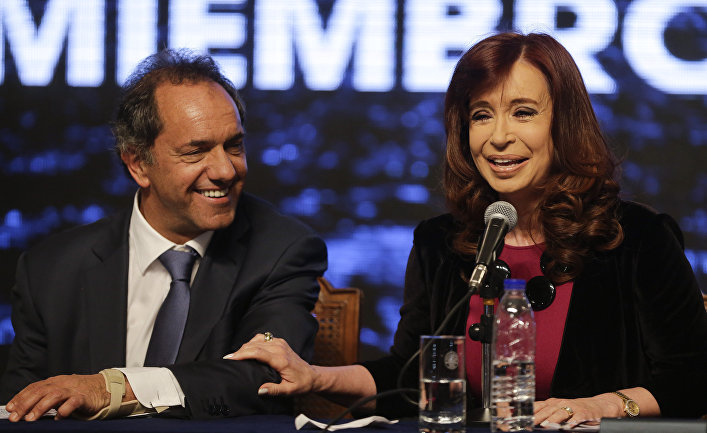Just days before the presidential elections not one of the catastrophic predictions, that filled Argentinean political scene since 2013 elections, have come true: no massive electoral failures, no exchange rate crashes or no inflation gales, no social upheavals or judicial apocalypse has happened. Victory Front presidential candidate and the governor of Buenos Aires Daniel Scioli already confirmed heads of his tough-on-crime Cabinet. That’s where the trouble starts.
Alejandro Granados, could be named Defense Minister, Buenos Aires province Justice Minister Ricardo Casal, will have a chair in his Scioli's Cabinet as well. President Cristina Fernández de Kirchner’s Security Secretary Sergio Berni could be in the list. These politicians offer an ideology and talk business, yet each one of them carries a load of controversies, hence being targets of human rights groups.
Despite the most intense international crisis in nine decades, which was not only concentrated in the financial sector, but also spread to all imaginable areas, Argentina comes to the polls in the state of unmatched calmness, incomparable to the previous transitions that the country has seen in the past: transitions from dictatorship to democracy in 1983; from the radicalism to Peronism in 1989; from a Peronist Carlos Menem to Alliance for Work, Justice, and Education in 1999; and from that chaos to political, economic and social reconstruction in 2003. The situation is akin to the span of menemists and kirchnerists in 1995, 2007, and 2011 respectively. It is a similar situation, but not the same, because the proportions of the transition is a mystery to be revealed.
Rarely has a political process been socially defined by such a figure as Cristina Fernandez de Kirchner (CFK), during her first presidency. This privileged player has been with the working class, that was suffering its lowest level of organization for the past 70 years, except for the day when Juan Peron stormed into the Argentinean reality. All the policies implemented by the state in these eight years have such a reference in its core, which shows it was no straight path. As a general rule, those who have had a preferential advantage and have engaged in corrupt dealings have been neutralized. Their numbers have been decreased to the point where they merely function as a theatrical simulation of the worst antagonists of those interests which they so outspokenly represented.
Argentina's president is leaving an economic mess to her successor. Only in Argentina would anyone debate that it's not actually a big mess.
— Taos Turner (@taos) October 14, 2015
The snapshot of Mauricio Macrì, Chief of Government of Buenos Aires and a presidential candidate, embracing other two contenders, labor leader Hugo Moyano and Peronist militant Geronimo Venegas, (the latter two could not overcome the 1.5 percent of the election threshold), at the inauguration of a monument to Juan Peron is eloquent.
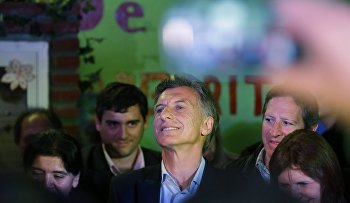
Just like the radical Ernesto Sanz, Moyano must thank the outright sincerity and the way it is expressed without any rational critic: Mauricio Macrì is his partner and his government, "he, supposedly was the first to recognize the workers’ rights" he went on to say. He never clarified which workers was he talking about exactly.
The truth is that 2015 is a year of wage recovery. The waning inflation balances around 25 percent a year and wage increases are going to overcome the 30 percent threshold. These publicly available data, explain why the ruling party consolidated its positions over the opposition, despite its infinite clumsiness to conceal an effect of its indisputable impact on poverty. The main emerging dispute is who can overcome the magic brink of 30 percent to force a run-off and in that case who could win it. If it depended on Mauricio Macrì and Sergio Massa (Justicialist Party), neither would reach the second round in November. The only hope resides on the unsatisfactory candidacy of Daniel Scioli, who must also reach a percentage goal which appears forthcoming, although it is not assured. Last month it turned out that the Victory Front made it into the final race. That was reinstated by Mauricio Marci's high rejection level, who in the open primaries (PASO) had not even reached 50 percent in the Autonomous City of Buenos Aires where he governed. All of these numbers seem today extraordinary: 54 percent of Cristina Fernández de Kirchner in 2011; 51.9 percent of Carlos Menem in 1995; or 51.5 percent of Raul Alfonsín in 1983. Even 42.8 percent victory of Eduardo Duhalde of Justicialist party in 1999 are now numbers to desire.
Why Argentina’s President Fernández Is Still So Popular—and Why the Elite Hate Her https://t.co/zYiL5XwY8f
— The Nation (@thenation) October 20, 2015
What comes next
The victory of Mauricio Macrì or Sergio Massa seems to be a remote possibility now. Scioli’s presidency with or without second round will reconfigure the whole political map after 10 December. During the primaries it was revealed that nine out ten votes have a Peronist component, whose temperamental capacity for reunification has already turned into one of the basic characteristics of the political system.
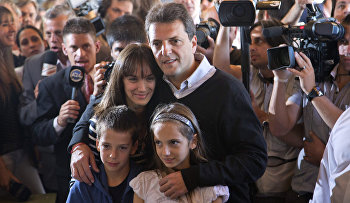
The first major question is, how will the difficult relationship between Cristina Fernández de Kirchner and Daniel Scioli develop. Their exchange was optimistically defined as unity in diversity by Carlos Zannini (lawyer and politician). Two deeply-rooted traditions collide: the first places the owner of institutional mandate into the center of gravity, and the second favors the political leadership above any other formal requirement. Both traditions have been clearly articulated by the respected spokesmen. Salta’s Governor Juan Manuel Urtubey outlined that the government and the rule of CFK come to an end in two months.
#Argentina: bye bye Kirchnerism, hello #austerity? https://t.co/EUS5kQ462i via @equaltimes #Elections pic.twitter.com/VaHYBf3B3N
— Equal Times (@equaltimes) October 21, 2015
Zannini replied that political leadership will continue beyond the constitutional restriction, that prohibits to apply for a new mandate to a president who has finishing their second term (the only exception was Nestor Kirchner who did not run for re-election). Same prohibition exists in Latin America, just shy of Evo Morales, who leads the chart of privileged ranking. There were three cases where both forms of power didn’t coincide with each other, the political leadership prevailed over the institutional one and the outcome was pitiful: Ricardo Balbin hindered the government of Arturo Umberto Illia in the 1960s; Juan Peron did the same with Héctor Cámpora; and Raul Alfonsin repeated the strategy with Fernando De la Rua in the first decade of this century. Leaving the office Cristina Fernandez de Kirchner keeps positions in the legislative blocs, in the Office of Public Prosecutor and in the Central Bank, in addition to the political leadership and the leading in the organized militant core whose real consistency will be tested outside of the government. To get rid of these bonds DOS could provoke the moves that would change the balance in its favor, or wait for 2017 to put together the legislative lists to make the same effect.
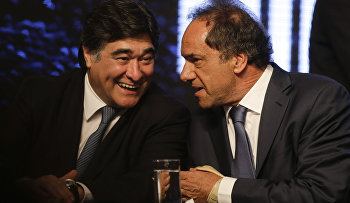
The Renewal Front, founded by Peronist Sergio Massa, could be an evident source of help for the victory. Massa's dilemma would be to join the stream, while creating himself a position of the savior within the same political system, or he'd have to stay as a Peronist opposition to the Peronist government. It is less obvious so far what may happen in the Cambiemos, represented by Mauricio Marci. On the one hand it may cause a radical graft, 3 percent of which during the primaries in August would make an ephemeral self defeated presidency of Ernesto Sanz into the historic event. But the background definitiveness will be produced by Macri's Republican Proposal (PRO). It is hard to imagine the hedonist Macrì to remain as the party's chief, while pending and waiting for the new presidential bet. In a moment of candor he confessed that in that case he would go to the United States or Italy with his younger daughter and his wife. Another pleasant alternative would be a new presidency mandate of Boca Juniors club (sports club), where elections take place on December 6.
What would happen to Horacio Rodriguez Larreta (PRO), whose Justicialistas government positions are less remembered than his career path as Macri’s administrator? During Carlos Menem presidency he was ANSES chief general manager, then Undersecretary for Social Policy and director of the National Fund for Social Capital, and during the government of Carlos Ruckauf, he took the promotion to the position of president of the Institute of Social Welfare of Buenos Aires. Also Macri’s retirement would reinforce the temptation to form an agreement with Scioli for Cristian Ritondo and Diego Santilli, two Peronists who have shown major capability to play with colored balloons during recent years. It is impossible to imagine that CFK stays passive during such a reorganization of the game board. The reconstruction of the party system after the crisis at the end of the century seems to be far from finished.
Ideology and the negotiations
Even though he had posed along with other regional populists’ presidents during the campaign, Scioli’s strategy is oriented much further to the north, according to the unambiguous explanation of Salta’s Governor Juan Manuel Urtubey. It is not even important who is going to be the next Minister of Foreign Affairs in Scioli's office or who decides to stay in Salta. From that point Urtubey exercises the role of a strong man from a governor’s league, who only values Scioli as an alternative to CFK, but in reality the governor does not consider Scioli to be any more but the first among the equals, according to Urtubey's own explanation. Tight realignment with the US would go against the profound Argentinean social tendencies. Pew Research Center released in June a global public opinion study which included 45,345 personal and telephone interviews conducted in 40 countries among adults above 18 years of age. Argentina is the country with the worst opinion about the United States, excluding the group of countries with large Muslim populations or ones that compete with Washington for global leadership. Half of the 40 countries demonstrated an average anti-American rate of 24 percent of the population. Argentina almost doubled the average with 43 percent. It is placed just after Jordan with 83 percent, Russia with 81 percent, Palestinian territories, occupied by Israel at 73 percent, Pakistan at 62 percent, Lebanon at 60 percent, Turkey at 58 percent, China at 49 percent, and Germany at 45 percent.
These Are the Five Curses Haunting Argentina's Next President http://t.co/gR3ppYpUP3 @charliedevereux pic.twitter.com/NIDZm9usWv
— Katia Porzecanski (@KatiaPorzo) October 14, 2015
Some premature announcements and rumors about Scioli's Cabinet (Alejandro Granados as Defense Minister, the head of penitentiary system Ricardo Casal as Justice, and Sergio Berni in Security) also demonstrate other points of collision with “kirchnerismo.” In September 2013, when Scioli offered him the Ministry of Security, Granados put it as a condition, if Scioli became president, he would want to be appointed as head of the Defense Ministry. As a Security Minister, Granados created a turmoil between security and police, and between police and institutional violence, leading it to the extreme. Scioli began to measure the achievements of his administration by the amount of "criminals killed,” which has nothing to do with a democratic way to ensure security in the country. In his last interview to the Nation, Granados said that he hated the statistics, which present 15,000 of the army troops in the northern border, where drug trafficking is associated with migration.
Whoever is interested why Granados, the mayor of Ezeiza, preferred the Defense Ministry, should know his ability to take over any property, a practice that he started with his famous restaurant The Watchtower (El Mangrullo) and continued with the Air Force land around the International Airport. Granados's son controls National Civil Aviation Administration, ANAC. In 2008 Air Force gave 535 hectares "in the area" of International Airport to Granados' father for a fee of approximate $820 a month. Ezeiza never paid the fee, but granted some of that land to soccer fields of the Boca Juniors Club, parking lots, small cinema, gyms, offices, cafes, warehouses and hotels. The concession was free for 30 years and for other than authorized activity, the municipality could only count on those lands for 10 years. But Boca Juniors took more space of the International Airport perimeter, which resulted into the legal proceedings that bounced from trial in court.
Horacio Verbitsky warns about the threat to Human rights in unequal cities @GUFPMilano @CELS_Argentina @ObservLatAm pic.twitter.com/uqjvmZ6Lgy
— Lena Simet (@LenaSimet) October 7, 2015
While Sergio Berni was accompanying CFK from Santa Cruz, he was never assigned any top-level responsibility. When the relationship with First Security Minister Nilda Garre became unsustainable, CFK received the suggestion to appoint Berni to the Security Ministry and to return Garre to Defense Ministry, where the frigates, under the management of Arturo Puricelli, were sunk or were captured by African countries. The President's reply was categorical: “Whoever doubts this option does not know me or Berni.” From the Security Ministry, Berni abjured from Kirchner's decision not to use the repressive methods against the social protests and protocols regulating the use of force in such cases.
This month, Federal Judge of San Isidro, Sandra Arroyo Salgado, dismissed the case of thirteen leftist militants processed by the courts of the Panamerican Highway. Gendarmerie forces riddled them with rubber bullets and used chemical agents against them. Berni also infiltrated a colonel among them from the Army Intelligence. Arroyo argued that the protesters were conducting a "legitimate exercise of their right to gather, in this particular case of petitioning to express their claims," their behavior "constitutionally protected, so there is no way they can be treated by the criminal law." Maybe now Berni and Colonel Roberto Galeano can be held accountable.
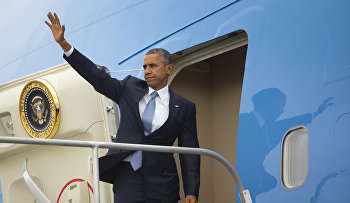
Casal is among those responsible for the softening of trial procedures, so the number of people held in custody today in Buenos Aires is the largest in history of the country. The imprisonment rate in the province is the highest in the country and in the region as well. Casal left to the Penitentiary System, which was formed as an administration of the prisons, through violence. This also increased the mortality rate caused by traumatic deaths among the prisoners. It was for that reason that Clarín publication chose to illustrate the announcement of his appointment with a picture of the government of Buenos Aires where Casal is accompanied by Attorney General Maria Falbo. She is on the verge of impeachment and criminal prosecution for the protection granted to Casal's friend Attorney General from San Isidro, Julio Alberto Novo, who is under investigation for covering drug traffickers; the impeachment proceedings were opened against him as well. In the meantime, his protégé, Gustavo Adolfo Julia is convicted in Spain. Novo appointed Julia’s defense attorney Mariana Busse, as a secretary of General Prosecutor.
Now Maria Falbo and Ricardo Casal, Julio Alberto Novo, deputy prosecutors Rodrigo Caro and Eduardo Vaiani, – are all facing accusations, but yet they still remain in office. The prosecutor Luis Angelini is requesting them to be suspended. Meanwhile, Novo, Caro, and Vaiani continue to manage the work of more than 60 prosecutors, who, among other things, examine cases of drug trafficking and oversee the judicial police.
